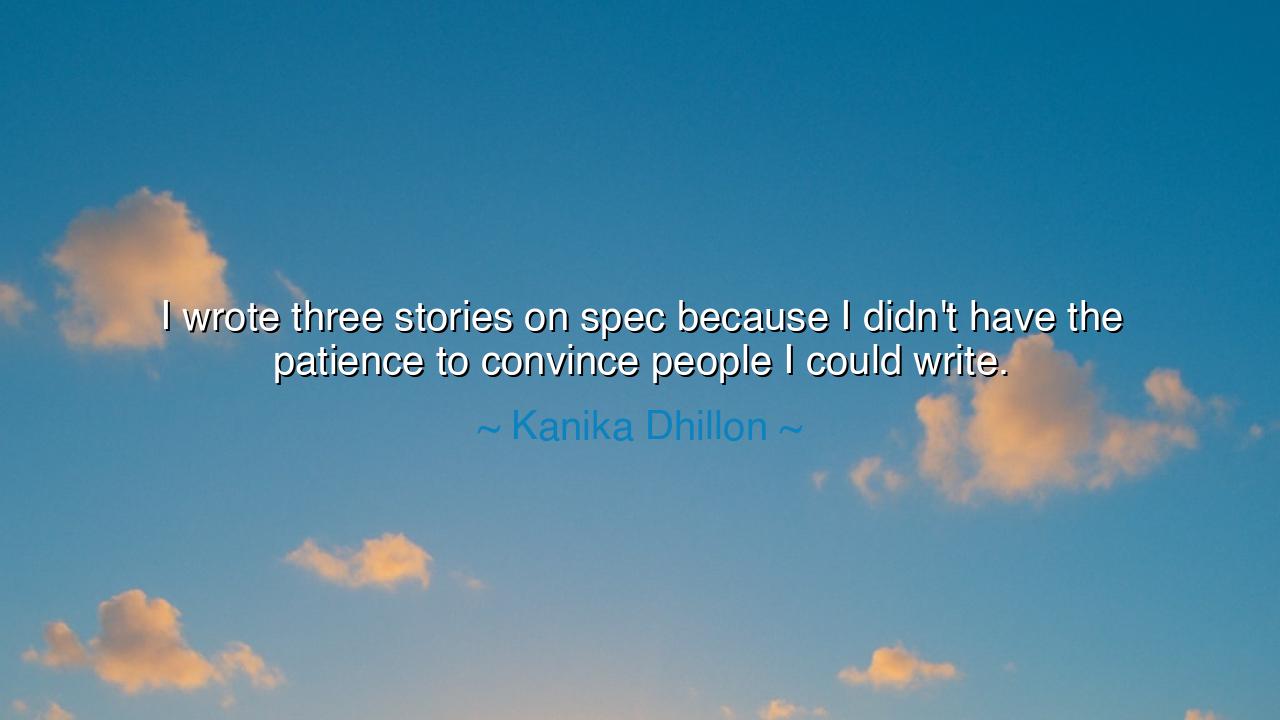
I wrote three stories on spec because I didn't have the patience
I wrote three stories on spec because I didn't have the patience to convince people I could write.






Hear now, O seekers of courage and makers of dreams, the words of Kanika Dhillon, who said: “I wrote three stories on spec because I didn’t have the patience to convince people I could write.” This utterance is not merely about ink on paper or words bound in books—it is a proclamation of defiance, of the spirit that chooses action over pleading, creation over waiting. For she teaches us that when the world doubts your power, when it demands you prove your worth through endless persuasion, sometimes the noblest answer is simply to do the work and let the work itself be the proof.
The origin of this truth lies in the eternal struggle between the dreamer and the gatekeeper. Through every age, there have been walls around the halls of opportunity—walls of doubt, of indifference, of power hoarded by the few. Many spend years knocking at those gates, seeking approval, begging for permission to step inside. Yet Dhillon, impatient with delay, chose a different path. She did not wait for others to confirm her identity as a writer. She became one by writing. Thus her words echo with ancient wisdom: that the truest authority is not granted from without, but forged from within.
Consider, O listeners, the story of Vincent van Gogh, who lived and died uncelebrated, his paintings ignored, his genius doubted. Had he waited for permission, had he sought endlessly to persuade others of his vision, he might never have painted the fields of gold or the starlit night. Yet he painted, again and again, because he could not be silenced. His legacy teaches, like Dhillon’s words, that the act itself is the testimony, and creation is stronger than argument. The world may delay its recognition, but truth shines through the work itself.
Dhillon’s impatience is not the impatience of arrogance, but the impatience of destiny. It is the fire that refuses to let talent rot while awaiting the nod of others. In this way, her stories written “on spec”—without commission, without promise—become heroic acts of faith. They are offerings laid at the altar of possibility, declarations that say: “I am what I claim to be, because I do the thing itself.” This is the courage of all innovators, artists, and visionaries who break through the silence not by talking about what they will do, but by doing it.
The wisdom here is that the world is not always swift to believe in you. Some will doubt your abilities, others will guard their gates, and many will ignore your voice. If you spend all your strength persuading them, you may lose the chance to create. But if you act, if you build, if you paint, write, compose, or craft, your work will stand as an unshakable truth that no gatekeeper can erase. For no one can deny a song once it has been sung, nor a story once it has been told.
Let the lesson be this: when your heart burns with purpose, do not delay. Do not wait endlessly for others to grant you permission to begin. Begin now. Begin imperfectly, begin without recognition, begin “on spec” if you must, but begin. For the act itself transforms you; the doing makes you what you claim to be. In life, as in art, the proof of your identity is not in persuasion, but in creation.
Practical actions flow from this truth. If you are a writer, write. If you are a builder, build. If you are a dreamer, dream aloud in deeds. Do not hide your gifts behind the excuses of doubt or delay. Share them, even if no one is asking. Sow your seeds without waiting for the rain, and in time, the harvest will reveal itself. Let your impatience be the holy impatience that drives you toward action, not the kind that paralyzes you with frustration.
Thus do we honor Kanika Dhillon’s words: that writing without permission, creating without validation, is an act of faith and power. Carry this teaching into your lives, O children of tomorrow, and remember—when the gates seem barred, when the world refuses to believe—let your work itself be the key. For in the end, the gates fall before those who no longer wait to be welcomed, but walk boldly forward, carrying the weight of their own creation.






AAdministratorAdministrator
Welcome, honored guests. Please leave a comment, we will respond soon